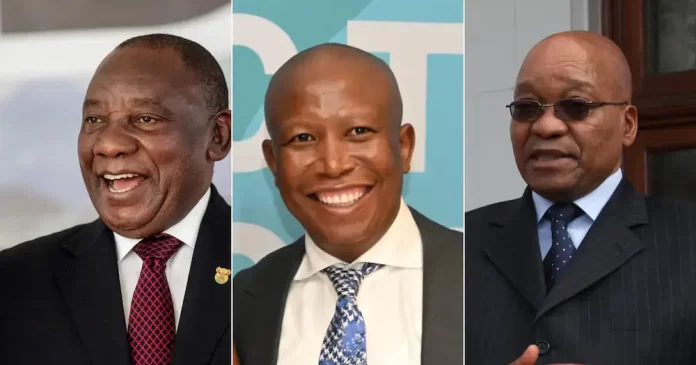The recently concluded elections in South Africa saw the African National Congress (ANC) fail to win a 50% majority vote. The ANC has been in power since 30 years ago, when the country started holding democratic elections.
The official results showed the ANC leading with 40.2%, down from 57.5% in the 2019 elections. The party also won 159 seats in the National Assembly, down from 230 in the 2019 elections. The Democratic Alliance (DA), which came in second, scored 21.8% and 87 seats in the National Assembly. Jacob Zuma’s new party, uMkhonto we Sizwe (MK), came in third with 14.6% and 58 seats in the National Assembly, followed by the EFF in the fourth position with 9.5%.
The results mean that the ANC has to share power with one of the major rival parties in order to keep it, and it has to happen within two weeks before the first parliament sitting to choose the president. Zuma’s party has already made it clear that they can form a coalition with the ANC, but on the condition that Cyril Ramaphosa is not the leader of the ANC. So, will the ANC accept firing Ramaphosa? Possibly not. Ramaphosa has already ruled out resigning and said it is impossible, meaning the coalition is likely to have the EFF and DA.
The ANC government has had serious issues in recent years, with high levels of corruption, power blackouts, unemployment, and inequalities. This angered voters, and the anger was finally exhibited on the ballot. The constant mistreatment of Jacob Zuma by the ANC, headed by President Ramaphosa, sealed the ANC’s fate. Zuma, who happens to be a kingmaker in the biggest Kwazulu-Natal province, has been in and out of prison and decided to form his party, which directly affected the ANC support since most of the supporters, mostly in the Kwazulu-Natal province, defected.
Like most other long-serving political parties, the ANC, having been in power for over 30 years, has dwindled in performance and service delivery. The hike in unemployment levels, corruption, inequalities, and constant power and water cuts could leave the ANC. The same is true politically, and most likely it is the beginning of the end of the party’s era at the helm of South Africa’s politics.
Despite attracting the youth and preaching Pan-Africanism and the end of white supremacy in South Africa, the EFF has not attracted the willingness of South Africans to vote the party into power. The element of violence and radicalism is not good for any civilized society, and no matter what crowds Malema has always pulled, it has not been able to reflect in the ballot outcomes.
Uganda has a lot to learn from the elections and political landscape in South Africa. The NRM has been in power for a long time, but support and winning percentages have gradually dwindled. The corruption, unemployment, and lack of service delivery will keep affecting the performance of the ruling party if not well tackled, as it happened in South Africa.
The EFF scenario in South Africa shares something in common with Uganda’s NUP and its president, Robert Kyagulanyi, aka Bobi Wine. Whereas Malema and the EFF fight white supremacy and preach Pan-Africanism, the NUP and Bobi Wine in Uganda preach sectarianism and promote white supremacy and imperialism. What they share in common is attracting the youth, pulling crowds that do not reflect on the ballot, as well as promoting violence and radicalism. No citizen would vote for parties built on gangs and ideological disorientation.















